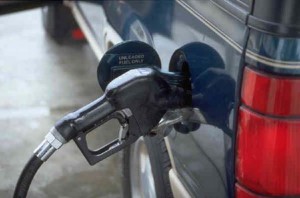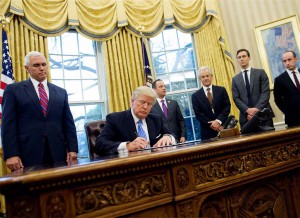The man who wants to order a sharp cut in both corporate and personal taxes could be ready to support an increase in federal gasoline taxes.
“It’s something that I would certainly consider,” President Donald Trump said during an interview with the Bloomberg news service.
It’s an unexpected position by a president who has been calling for sharp cuts in both taxes and government operations, but Trump signaled it may be the way to fund the massive infrastructure program he has been calling for.
(Tax cuts, import duties and more. Click Here to see how Pres. Trump is being graded by the auto industry.)
The federal government currently adds 18.4 cents in excise taxes to every gallon of gasoline sold in the U.S., and 24.4 centers per gallon for diesel fuel. Though individual states have adjusted their own fuel taxes in recent years, the federal tax has not been adjusted since 1993, and political observers have long believed that tampering with the figure would be a political third rail, unacceptable to American voters.
But there is a surprisingly broad consortium of backers for raising the fuel tax. That includes environmentalists who believe such a move would encourage greater vehicle efficiency and reduce demand for petroleum. A number of auto industry officials, including veteran Bob Lutz, a former General Motors Vice Chairman, have also backed higher fuel prices as a way to promote more efficient and electrified vehicles.
The current fuel tax is used to support the national highway trust fund, money going to projects such as bridge building and road repairs. But as inflation has steadily eaten into the fund it has effectively grown smaller over the past two decades, especially as U.S. fuel consumption has been leveling off.
(GM CEO Mary Barra says no to rumors she will join Trump Admin. Click Here for the story.)
Some backers of an increase believe a hike is necessary to pay for the billions of dollars in road repairs needed across the country. A number of studies have indicated that crumbling roads and bridges lead to increase costs due to slower traffic and damages to cars and trucks from such things as potholes.
“The cost of doing nothing is more expensive than a higher fuel tax,” said Chris Spears, president of the American Trucking Association – which represents a group that currently pays about half of the fuel taxes generated each year.
Beyond the Middle East and some other oil producing nations such as Venezuela, the U.S. has some of the world’s lowest fuel taxes. In Canada. Motorists pay about 40 cents per gallon of gasoline in federal taxes plus provincial taxes. In Germany, the figure is about $2.65 cents on gas, and $1.90 cents on diesel.
The congressional Joint Committee on Taxation has estimated that adding 35 cents a gallon to the current federal excise tax – and then indexing that figure to inflation – would generate an additional $473.6 billion over the next decade.
On Capitol Hill, the president’s comments generated a mixed response. When asked if he would be open to a hike, House Ways and Means Committee Chairman Kevin Brady, R-Texas, told reporters Monday, “In my view, yes.” But Congressman Brady added, “we’re going to have that discussion with the White House and we want to learn more about the president’s ideas.”
Some observers caution that raising the gas tax would disproportionately hurt the Middle Class and, in particular, the working poor who often must drive to work in older, less efficient vehicles.
The president did not indicate how or when he would move forward on a proposed gas tax hike, or if it would be presented to Congress as part of a more detailed revision of the U.S. tax code. The White House last week revealed a one-page outline for radical changes in the tax system. Critics have warned the plan could substantially increase the country’s deficit, though proponents contend it would offset any loss in federal revenues by boosting the overall economy.
(GM says it will be first automaker to turn profit on EVs. Click Here for the story.)



